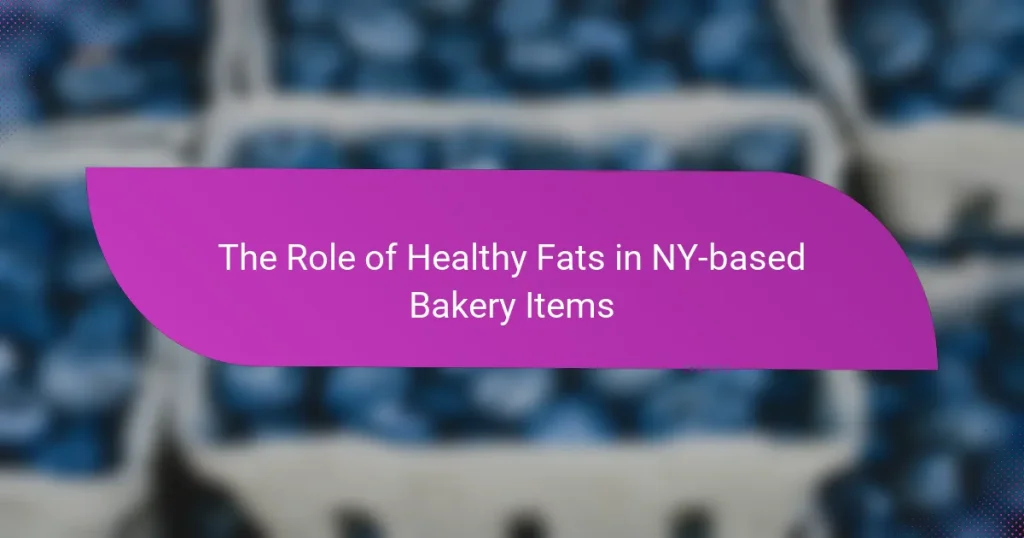Healthy fats, primarily unsaturated fats, play a crucial role in enhancing the nutritional profile of bakery items in New York. These fats, sourced from ingredients like avocados, nuts, seeds, and olive oil, provide essential nutrients that promote overall health, improve heart health, and support the absorption of fat-soluble vitamins A, D, E, and K. By replacing traditional saturated fats with healthy fats, NY bakeries not only enhance flavor, texture, and moisture in their products but also align with consumer demand for healthier options. Research indicates that incorporating healthy fats can lower inflammation and reduce the risk of chronic diseases, making them a significant component in modern baking practices.

What are Healthy Fats and Their Importance in Baking?
Healthy fats are unsaturated fats that provide essential nutrients and promote overall health. They include sources such as avocados, nuts, seeds, and olive oil. In baking, healthy fats contribute to flavor, texture, and moisture. They can enhance the nutritional profile of baked goods. Healthy fats also support the absorption of fat-soluble vitamins like A, D, E, and K. Research indicates that incorporating healthy fats can improve heart health and reduce inflammation. For instance, the American Heart Association recommends replacing saturated fats with unsaturated fats for better cardiovascular outcomes.
How do healthy fats differ from unhealthy fats?
Healthy fats are beneficial for health, while unhealthy fats can lead to health issues. Healthy fats include monounsaturated and polyunsaturated fats. These fats can improve cholesterol levels and reduce the risk of heart disease. Sources of healthy fats include avocados, nuts, seeds, and olive oil. Unhealthy fats consist mainly of trans fats and saturated fats. Trans fats are often found in processed foods and can increase bad cholesterol levels. Saturated fats are primarily found in animal products and can contribute to heart disease. Research indicates that replacing unhealthy fats with healthy fats can improve overall health outcomes.
What are the primary sources of healthy fats?
Primary sources of healthy fats include avocados, nuts, seeds, and olive oil. Avocados are rich in monounsaturated fats, which support heart health. Nuts, such as almonds and walnuts, provide omega-3 and omega-6 fatty acids. Seeds like chia and flaxseeds are excellent sources of plant-based omega-3s. Olive oil is high in monounsaturated fats and has anti-inflammatory properties. These sources contribute essential fatty acids that are beneficial for overall health.
Why are healthy fats essential for baking?
Healthy fats are essential for baking because they contribute to flavor, texture, and moisture. They enhance the richness of baked goods, making them more enjoyable. Healthy fats also help in creating a tender crumb structure, which is crucial for cakes and pastries. Additionally, they assist in the leavening process, improving the rise of baked items. Studies show that incorporating healthy fats, such as those from nuts and avocados, can improve the overall nutritional profile of baked goods. This addition can lead to increased satisfaction and better health outcomes.
What role do healthy fats play in the texture and flavor of bakery items?
Healthy fats significantly enhance the texture and flavor of bakery items. They contribute to a moist and tender crumb structure. Healthy fats, such as those from avocados or nuts, provide a rich mouthfeel. This richness balances sweetness in baked goods. Additionally, they improve the overall flavor profile, making items more appealing. Healthy fats also aid in the browning process, resulting in a desirable crust. Studies show that fats can carry flavor compounds, enhancing the overall taste experience. Thus, incorporating healthy fats is essential for quality bakery products.
How do healthy fats influence the moisture content in baked goods?
Healthy fats enhance the moisture content in baked goods. They contribute to a tender texture by coating flour particles, which helps to prevent gluten formation. This results in a softer crumb structure. Additionally, healthy fats can hold onto moisture during baking. Oils, for instance, can create a barrier that retains water. This retention leads to a fresher product that remains moist over time. Studies show that recipes with healthy fats often yield a more desirable mouthfeel. Thus, incorporating healthy fats is crucial for achieving optimal moisture levels in baked goods.
What impact do healthy fats have on the overall taste of bakery products?
Healthy fats enhance the overall taste of bakery products by providing richness and depth of flavor. They contribute to a moist texture, making baked goods more enjoyable. Healthy fats, such as those from avocados or nuts, can add unique flavor profiles that elevate standard recipes. They also improve mouthfeel, making products feel creamier and more satisfying. The presence of healthy fats can balance sweetness and acidity, creating a more harmonious taste experience. Additionally, they can help in the browning process during baking, which enhances flavor through the Maillard reaction. Overall, healthy fats play a crucial role in the sensory qualities of bakery items.

How are Healthy Fats Incorporated in NY-based Bakery Items?
Healthy fats are incorporated in NY-based bakery items through the use of ingredients like avocado, nuts, and olive oil. These ingredients provide essential fatty acids beneficial for health. Avocado can replace butter in recipes, offering a creamy texture without saturated fats. Nuts add crunch and flavor while contributing healthy omega-3 fatty acids. Olive oil is often used in place of traditional fats for its heart-healthy properties. Many NY bakeries focus on using these alternatives to enhance nutritional value. This trend aligns with consumer demand for healthier options in baked goods.
What types of healthy fats are commonly used in NY bakeries?
Olive oil, avocado oil, and coconut oil are commonly used healthy fats in NY bakeries. Olive oil is rich in monounsaturated fats and antioxidants. It enhances flavor and provides health benefits. Avocado oil is another popular choice due to its high smoke point and nutrient profile. It contains heart-healthy fats and vitamins. Coconut oil is favored for its unique flavor and medium-chain triglycerides. These fats contribute to the texture and moisture of baked goods. Many bakeries in NYC focus on using these healthier fat options to cater to health-conscious consumers.
How do local regulations affect fat usage in bakeries?
Local regulations significantly impact fat usage in bakeries. These regulations can dictate the types of fats that are permissible for use in baked goods. For instance, some jurisdictions may restrict trans fats due to health concerns. Regulations often require bakeries to disclose nutritional information, influencing choices towards healthier fats. Compliance with health codes can lead to the adoption of alternatives like olive oil or avocado oil. Furthermore, local ordinances may promote the use of organic or locally sourced fats. This can enhance the bakery’s appeal to health-conscious consumers. Ultimately, local regulations shape not just the ingredients but also the overall product offerings in bakeries.
What are the trends in healthy fat usage among NY bakers?
New York bakers are increasingly incorporating healthy fats into their recipes. Many are replacing traditional fats with alternatives like avocado oil and coconut oil. This shift aims to enhance nutritional profiles while maintaining flavor. Bakers are also utilizing nut butters and seed oils for their health benefits. The trend reflects a growing consumer demand for healthier options. Research shows that healthier fats can improve heart health and overall wellness. Additionally, many bakers are labeling their products to highlight these healthier fat choices. This trend aligns with the broader movement towards clean eating and wellness in the food industry.
What are the challenges of using healthy fats in bakery items?
Using healthy fats in bakery items presents several challenges. One challenge is texture alteration. Healthy fats often have different melting points compared to traditional fats. This can lead to changes in the crumb structure of baked goods.
Another challenge is flavor impact. Healthy fats may impart distinct flavors that differ from conventional options. This can affect consumer acceptance.
Additionally, healthy fats can influence shelf life. Many healthy fats are more prone to oxidation. This can lead to rancidity and shorter product longevity.
Cost is also a significant factor. Healthy fats tend to be more expensive than traditional fats. This can increase overall production costs for bakeries.
Finally, formulation adjustments are often necessary. Substituting healthy fats may require changes in other ingredients. This can complicate recipe development and consistency.
How do bakers overcome the challenges of substituting unhealthy fats?
Bakers overcome the challenges of substituting unhealthy fats by using healthier alternatives like applesauce or coconut oil. These substitutes provide moisture and flavor without the negative health effects of trans fats. For example, applesauce can replace butter in recipes, reducing calories and fat content. Coconut oil offers a similar texture to butter while being plant-based. Additionally, bakers often experiment with combinations of these alternatives to achieve desired textures. Research indicates that these substitutions can maintain product quality while improving nutritional profiles. A study published in the Journal of Food Science found that baked goods using healthier fats had comparable taste and texture to those made with traditional fats.
What are the cost implications of using healthy fats in baking?
Using healthy fats in baking generally increases ingredient costs. Healthy fats, such as avocado oil or coconut oil, are often more expensive than traditional fats like butter or margarine. For instance, avocado oil can cost up to three times more per liter compared to vegetable oil. Additionally, sourcing high-quality, organic healthy fats may further elevate costs.
This price increase can impact the overall pricing of baked goods. Bakeries may need to adjust their pricing strategies to maintain profit margins. A study from the Journal of Food Science found that incorporating healthier ingredients can raise production costs by 10-20%.
Ultimately, while healthy fats can enhance the nutritional profile of baked goods, they do come with higher financial implications for bakeries.

What are the Health Benefits of Healthy Fats in Bakery Items?
Healthy fats in bakery items provide essential nutrients and support overall health. They can improve heart health by reducing bad cholesterol levels. Healthy fats, such as those from nuts and avocados, contain omega-3 fatty acids. These fatty acids are known to lower inflammation and decrease the risk of chronic diseases. Additionally, healthy fats enhance the absorption of fat-soluble vitamins like A, D, E, and K. Research indicates that incorporating healthy fats into the diet can promote satiety, aiding in weight management. A study published in the American Journal of Clinical Nutrition found that diets rich in healthy fats can improve metabolic health. Thus, including healthy fats in bakery items contributes positively to nutrition and well-being.
How do healthy fats contribute to nutritional value?
Healthy fats contribute to nutritional value by providing essential fatty acids and aiding in nutrient absorption. They are a source of concentrated energy, offering 9 calories per gram. Healthy fats support cell structure and function. They play a role in hormone production and regulation. Foods rich in healthy fats, like avocados and nuts, contain vitamins A, D, E, and K, which are fat-soluble. Studies show that incorporating healthy fats can improve heart health and lower bad cholesterol levels. For instance, the American Heart Association recommends replacing saturated fats with unsaturated fats for better cardiovascular health.
What specific health benefits do healthy fats provide to consumers?
Healthy fats provide numerous health benefits to consumers. They support heart health by improving cholesterol levels. Healthy fats can reduce inflammation in the body. They aid in nutrient absorption, particularly for fat-soluble vitamins like A, D, E, and K. Additionally, healthy fats can enhance brain function and cognitive performance. Research shows that diets rich in healthy fats can lower the risk of chronic diseases. For example, the American Heart Association highlights the positive effects of omega-3 fatty acids found in sources like fish and flaxseeds. These fats can also promote satiety, helping with weight management.
How do healthy fats support dietary needs for various populations?
Healthy fats support dietary needs for various populations by providing essential fatty acids and promoting nutrient absorption. These fats include sources like avocados, nuts, and olive oil. Essential fatty acids, such as omega-3 and omega-6, are critical for brain health and development. They are particularly important for children and pregnant women. Healthy fats also help in the absorption of fat-soluble vitamins A, D, E, and K. This is crucial for overall health across different age groups. Additionally, healthy fats can improve heart health by reducing bad cholesterol levels. Studies show that diets rich in healthy fats are associated with lower risks of chronic diseases. Thus, incorporating healthy fats into diets can meet the nutritional needs of diverse populations.
What are some popular NY bakery items that feature healthy fats?
Popular NY bakery items that feature healthy fats include avocado muffins, almond croissants, and olive oil cakes. Avocado muffins incorporate avocado, which is rich in monounsaturated fats. Almond croissants use almond paste, providing healthy fats from almonds. Olive oil cakes utilize olive oil, known for its heart-healthy properties. These items are often found in various bakeries across New York City. They highlight the trend of using healthier fat sources in baked goods.
How do these items compare to traditional counterparts?
Healthy fats in NY-based bakery items generally offer better nutritional profiles compared to traditional counterparts. They can provide essential fatty acids and improve heart health. For example, using avocado oil instead of butter reduces saturated fat intake. Additionally, healthy fats can enhance flavor and texture. Research indicates that incorporating nuts and seeds can increase fiber content. Traditional bakery items often rely on refined sugars and unhealthy fats. This can lead to higher calorie counts and lower nutritional value. Overall, healthy fats contribute positively to the overall health benefits of bakery items.
What are the consumer preferences regarding healthy fat bakery items?
Consumers prefer healthy fat bakery items that incorporate ingredients like avocado, nuts, and olive oil. These ingredients are perceived as healthier alternatives to traditional fats. Many consumers seek items that provide nutritional benefits without sacrificing taste. Research shows that 70% of consumers are willing to pay more for healthier options. Additionally, items labeled as “low in saturated fat” attract more attention. The demand for gluten-free and vegan options is also increasing among health-conscious consumers. Taste and texture remain crucial factors influencing their choices. Overall, there is a growing trend towards healthier, flavorful bakery products.
What are the best practices for incorporating healthy fats in baking?
Incorporating healthy fats in baking enhances flavor and nutrition. Use oils like olive or avocado for their heart-healthy properties. Substitute butter with these oils at a 1:1 ratio for a healthier option. Include nut butters for added protein and rich flavor. Avocados can replace butter in recipes, adding creaminess and healthy fats. Choose coconut oil for its unique flavor and medium-chain triglycerides. Measure fats accurately to maintain texture and moisture in baked goods. Experiment with different healthy fats to find the best combinations for your recipes. These practices ensure that baked items remain delicious while boosting their health benefits.
How can bakers effectively balance flavor and health in their recipes?
Bakers can effectively balance flavor and health in their recipes by incorporating healthy fats. Healthy fats, such as those from avocados, nuts, and olive oil, enhance flavor while providing nutritional benefits. These fats can replace less healthy options like butter or margarine. Research indicates that using healthy fats can improve the overall health profile of baked goods without sacrificing taste. For example, a study published in the Journal of Nutrition found that incorporating nuts into baked recipes increased both flavor and nutrient density. Additionally, bakers can experiment with flavorings like herbs and spices to further enhance taste without adding excess sugar or unhealthy fats.
What tips can help consumers choose healthier bakery options?
Choose whole grain options for healthier bakery products. Whole grains contain more fiber and nutrients than refined flour. Look for items labeled as “100% whole grain” or “whole wheat.” Check the ingredient list for healthy fats like olive oil or avocado oil. These fats are better for heart health compared to trans fats or saturated fats. Avoid products with added sugars, which can increase calorie content. Opt for baked goods with natural sweeteners like honey or maple syrup. Pay attention to portion sizes, as even healthy options can be calorie-dense. Finally, consider the presence of fruits or nuts, which can add beneficial nutrients.
The main entity of the article is healthy fats in the context of NY-based bakery items. The article explores the importance of healthy fats, such as those derived from avocados, nuts, and olive oil, in enhancing the flavor, texture, and nutritional profile of baked goods. It discusses the differences between healthy and unhealthy fats, the primary sources of healthy fats, and their essential roles in baking. Additionally, the article addresses consumer preferences, trends in fat usage among bakers, challenges faced when substituting unhealthy fats, and best practices for incorporating healthy fats into recipes. Overall, it emphasizes the health benefits of healthy fats and their growing presence in the bakery industry.




